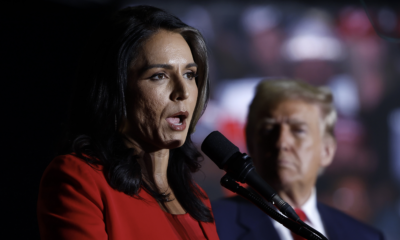News
California Bombing Outside Fertility Clinic Deemed ‘Act of Terrorism’ by FBI
A deadly California bombing outside a reproductive health facility in Palm Springs, California, has prompted a federal terrorism investigation, after one person was killed and at least four others were injured in the Saturday morning explosion. The blast occurred outside American Reproductive Centres (ARC), a fertility clinic offering services such as in vitro fertilisation and genetic testing. According to authorities, the explosive device detonated in or near a parked vehicle just before 11 a.m., causing massive damage to the vehicle, the clinic, and nearby buildings.
“This was no accident,” said Akil Davis, assistant director of the FBI’s Los Angeles field office, during a press briefing. “Make no mistake, this is an intentional act of terrorism.”
While Akil Davis did not clarify whether the California bombing is being investigated as domestic or international terrorism, he confirmed that a person of interest is currently in custody or under surveillance, and authorities are not seeking additional suspects at this time.
Donald Trump Pushes Free IVF Access, Teaming Up with Elon Musk to Slash Government Spending
Community Shaken by Violence
Palm Springs Mayor Ron deHarte described the explosion as a targeted attack. “The nature and location of this act make it clear that it was meant to instil fear, disrupt lives, and inflict maximum damage,” he said. “Our city is shaken, but we will not be intimidated.”
Witnesses reported hearing a powerful blast that rattled nearby windows and sent debris flying. Video footage of the California bombing circulating online showed a large hole torn through the clinic’s exterior wall and extensive structural damage to the one-story building.
Despite the devastation, ARC leadership said the clinic would remain operational. In a statement posted to Facebook, Dr. Maher Abdallah, the facility’s director, confirmed that all reproductive materials—including stored eggs and embryos—were safe and that no staff members were injured.
“The moment has shaken us — but it has not stopped us,” wrote Dr. Abdallah.
The clinic also confirmed it will resume full operations on Monday, a move meant to reassure patients and demonstrate resilience in the face of terror.
America’s Growing Divide: Fertility, Rights, and the Threat of Domestic Terrorism
The United States is witnessing a deepening political polarisation, as cultural and ethical debates over reproductive rights intensify. Fertility services—once considered private medical matters—have now become politicised battlegrounds. This Palm Springs bombing outside a fertility clinic could be labelled as an act of domestic terrorism. The FBI is yet to determine.
While abortion remains at the heart of reproductive debates, issues like in vitro fertilisation, genetic testing, and embryo storage are now being scrutinised by lawmakers and extremist groups alike. As courts and state legislatures wade into these complex areas, rhetoric surrounding “life” and “morality” fuels unrest.
Investigators Seek Motive
Details regarding the motive or the identity of the person killed have not been released. Authorities have not confirmed whether the deceased had any involvement in planting the device or was an unintended victim.
California Governor Gavin Newsom has been briefed on the incident and pledged state support in the ongoing federal investigation. “Acts of terror have no place in California,” a spokesperson from his office said in a statement.
The FBI is now working to analyse this act of terrorism to determine whether the bombing was connected to broader ideological motives, including extremist views surrounding reproductive rights, which have been flashpoints for violence in the United States for decades.
A Broader Pattern?
California bombing is the latest in a string of threats and attacks targeting reproductive health providers in the post-Roe v. Wade era. While many clinics have ramped up security, Saturday’s bombing underscores the urgent need for federal and state protection of these medical facilities.
Domestic terrorism linked to these polarising issues is rising, according to the FBI and civil rights groups. Acts of violence once isolated to abortion clinics are now expanding to broader reproductive health services. Experts warn that fringe ideologies are amplified online, where platforms often lack effective content moderation.
In this fractured landscape, political discourse is increasingly defined not by policy debate but by moral absolutism and fear. As institutions struggle to protect both free speech and public safety, America’s polarized climate shows no sign of cooling—raising urgent questions about how democracy can survive in a nation so deeply divided.
As Palm Springs begins to heal, one thing is clear: the attack may have damaged a building, but it has galvanised a community determined to continue offering essential health services without fear.










































